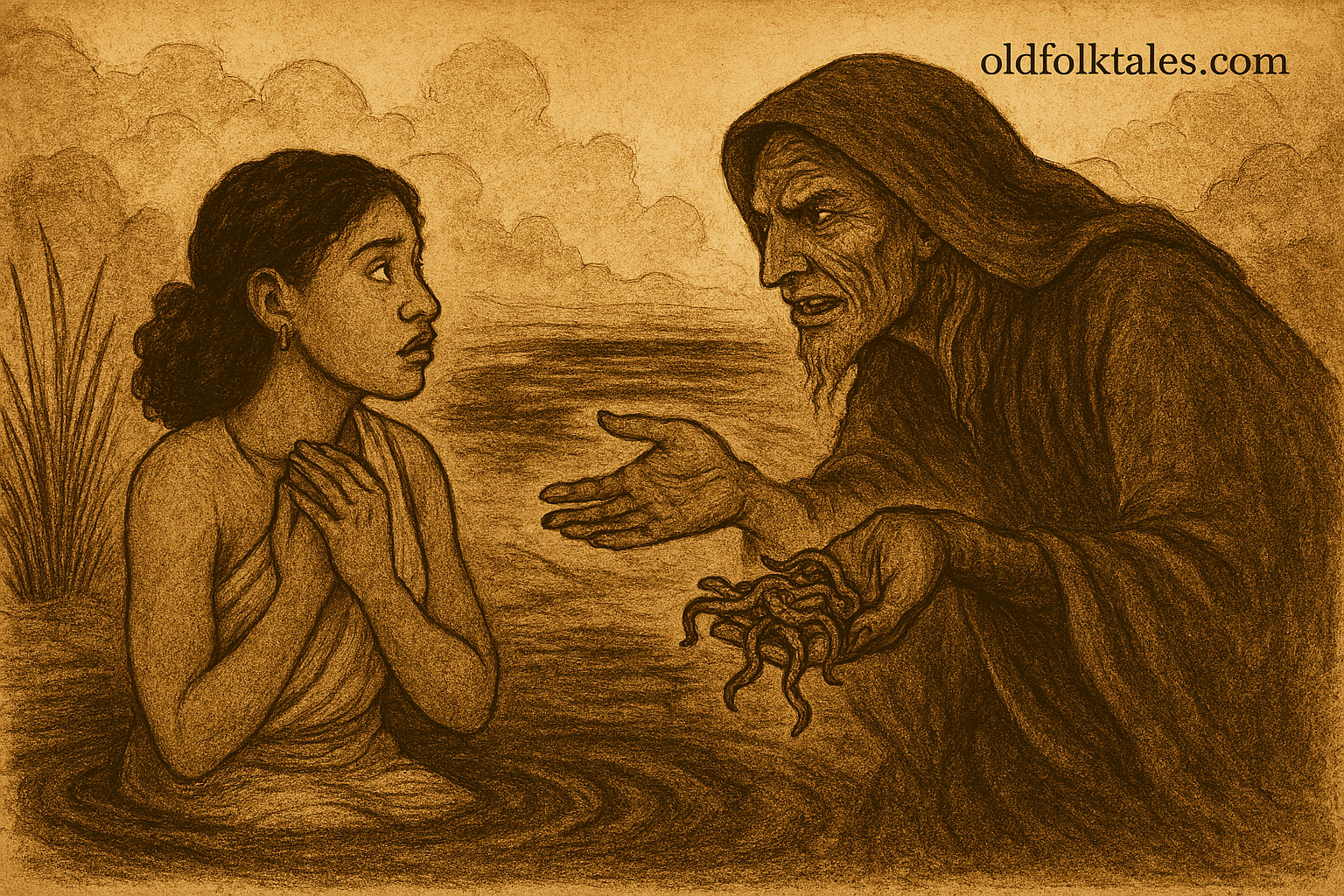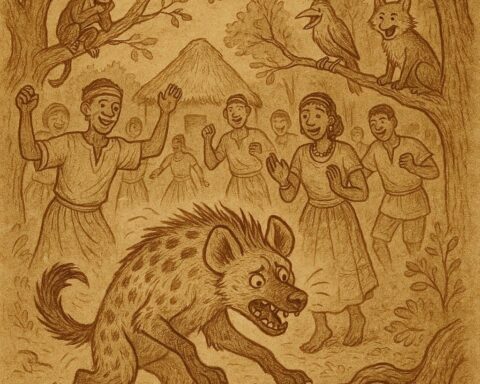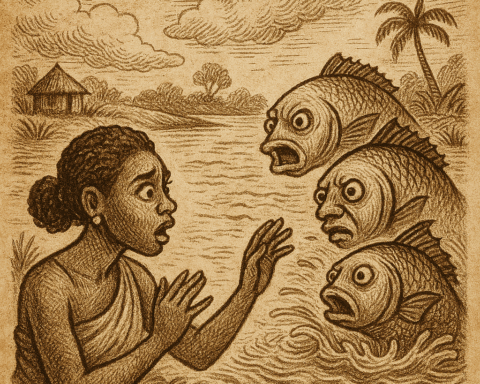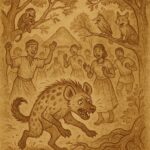In a village where the red earth met endless skies, there lived a young woman whose beauty was spoken of in hushed, reverent tones across the land. Beautiful Baba possessed the kind of extraordinary radiance that made the morning sun seem dim in comparison. Her skin gleamed like polished bronze, her eyes sparkled like stars dancing on water, and her smile could make even the wisest elders forget their own names. As she blossomed into womanhood, this remarkable beauty became both her greatest gift and her most dangerous curse.
Word of Baba’s stunning appearance spread like wildfire across neighboring villages and distant towns. Suitors began arriving at her family’s compound in an endless procession, each more determined than the last to win her hand in marriage. They came bearing gifts that had never been seen in their humble village gleaming automobiles that roared like metal beasts, motorcycles that sparkled in the sunlight, and mysterious machines whose purposes could only be guessed at. Handsome men with deep pockets and deeper desires knelt before her, offering everything they possessed for just one smile of acceptance.
But Baba’s beauty had grown into vanity, and her vanity had hardened into cruelty. She dismissed each suitor with contemptuous waves of her delicate hand, her laughter ringing cold and sharp as broken pottery. “Not handsome enough,” she would declare of one. “Not wealthy enough,” she would sneer at another. Her heart remained as untouchable as the moon, and her pride soared higher than the eagles that circled overhead.
Also read: The Kind Sister’s Reward
One sweltering afternoon, when the heat made the air shimmer like water, a figure approached the family compound. This man was the very opposite of all who had come before his clothes hung in tatters, dirt caked his weathered skin, and his hair was wild and unkempt. He shuffled forward with humble steps, his eyes downcast as he made his marriage proposal in a voice barely above a whisper.
Baba’s reaction was swift and merciless. Disgust danced across her beautiful features like shadows cast by storm clouds. Her lip curled in revulsion as she looked down at the poor man from her elevated position on the compound’s veranda.
“Many handsome men have come here seeking my hand, and I have turned them all away,” she declared, her voice dripping with haughty disdain. “Men with riches beyond counting, with faces carved by the gods themselves. Why would you dirty and poor as you are think I would lower myself to marry you? Leave this place immediately, before I call my father to throw you out like the refuse you are!”
Her father, a wise man whose years had taught him to see beyond the surface of things, witnessed this cruel display with growing unease. The weight of ancestral wisdom pressed upon his shoulders as he spoke, his voice carrying the gravity of generations:
“My daughter, listen well to these words. One who habitually peeps inside holes will one day be bitten by a snake, just as the dog that wanders without purpose will one day encounter a porcupine’s quills. Do not spit upon your fellow human beings, for they are all children of the same earth that gave you life. Mark my words one of these days, your ancestors will decide to intervene, and when they do, you will not like their verdict.”
But Baba waved away her father’s counsel as carelessly as she had dismissed her suitor. The rejected man bowed his head in acceptance and walked away from the compound, his footsteps raising small clouds of dust that glowed golden in the afternoon light.
As he moved beyond the village boundaries, something extraordinary began to happen. The man’s shabby form started to shimmer and blur, like heat waves rising from sun-baked stone. His hunched shoulders straightened into a proud, powerful stance. His tattered clothes transformed into garments of finest silk that caught the light like captured starbeams. His weathered face became smooth and handsome beyond description, with features so perfect they seemed carved by master craftsmen. Where moments before had stood a poor, dirty beggar, now stood the most magnificent man anyone in the vicinity had ever laid eyes upon.
A gleaming motorcycle appeared as if conjured from the very air, its chrome surface reflecting the sky like a mirror. The transformed stranger mounted this beautiful machine and rode back toward the village, the engine’s purr harmonizing with the wind like celestial music.
The moment Beautiful Baba saw this dazzling apparition approaching, her carefully constructed world of standards and requirements crumbled to dust. Her heart leaped in her chest like a caged bird suddenly set free, and desire burned through her veins like liquid fire.
“That’s my husband!” she declared with the fervor of divine revelation, pointing at the magnificent stranger with trembling fingers. “I have found the man worthy of my beauty! We are leaving this very moment!”
Her mother, sensing disaster approaching like storm clouds on the horizon, fell to her knees in desperate pleading. She covered herself with wood ash in the ancient gesture of mourning, wailing as if her daughter were already dead and buried. But Baba had become as determined as a hunting dog pursuing its quarry, deaf to all wisdom and blind to all warning signs.
With only a simple calabash filled with corn-chaff as provision for their journey, Beautiful Baba mounted the mysterious motorcycle. The engine roared to life, and they rode away from everything she had ever known, leaving behind a cloud of dust and her mother’s broken-hearted cries.
Their journey led them through landscapes that grew increasingly strange and foreboding. Ancient trees twisted into unnatural shapes, casting shadows that seemed to move independently of their branches. The very air grew thick and oppressive, filled with whispers in languages that predated human speech.
At the banks of a river so dark it seemed to swallow light itself, the true horror of Baba’s situation began to unfold like a nightmare blooming in daylight. Her handsome husband lifted his outer garment with deliberate ceremony, revealing depths that seemed to contain entire worlds of darkness. He demanded the calabash of corn-chaff, and after emptying the meager contents into the bottomless pocket of his garment, he scooped up writhing handfuls of fat, pale worms that glistened with otherworldly slime.
“Eat, my bride,” he commanded, offering the disgusting mass to her with a smile that no longer seemed charming but terrifying.
“Husband-mine,” Baba protested, her voice shaking with shock and growing fear, “you’re giving me worms to eat. Have I become nothing more than an animal to you?”
But the being who had stolen her heart fixed her with eyes that now glowed with supernatural fire. “Eat!” he commanded, and his voice carried such terrifying authority that she dared not disobey.
Reluctantly, fighting waves of nausea that threatened to overwhelm her, Baba consumed the writhing meal. Each handful was an agony of revulsion, her stomach churning with every swallow, but fear kept her obedient.
Their nightmarish journey continued until they reached his dwelling, a seven-roomed house that looked exactly like the haunted structures described in the ghost stories that had terrified her as a child. The walls seemed to breathe with malevolent life, and shadows moved within shadows in ways that defied all natural law. Her worst fears crystallized into reality when her supernatural husband locked her securely in the innermost room, the sound of the heavy bolt falling like the closing of a tomb.
Outside her prison, ominous sounds began to fill the air. Sharp, otherworldly cries pierced the darkness as supernatural beings gathered firewood for what could only be a funeral pyre. The rhythmic beating of drums created a funeral dirge that made her blood run cold with terror.
Through a small crack in the wall, Magheb-the-Hawk whispered urgently to her, his voice filled with desperate concern: “Let’s go away from this cursed place, Beautiful Baba. If you remain here even one more hour, you shall surely be killed and consumed.”
But Baba, still clinging desperately to her illusions of marriage and love, refused his offer of salvation. “He is my husband,” she insisted, though her voice wavered with growing uncertainty. “Surely he would not harm his own bride.”
It was only when Detswegh-the-Toad hopped to her feet, his ancient eyes filled with wisdom and compassion, that the full magnitude of her danger finally penetrated her consciousness. “Child of foolishness,” he croaked urgently, “you must escape this place immediately, or your bones will join those of the countless others who fell victim to this creature’s deceptions.”
Finally understanding the mortal peril she faced, Baba accepted the toad’s miraculous offer of rescue. Detswegh swallowed her deep into his stomach a space that expanded to accommodate her like a living sanctuary. He inserted a hollow twig down his throat so she could breathe, and when the gathering ghosts and spirits questioned his suddenly swollen appearance, the clever toad replied with perfect nonchalance:
“I have eaten my things, as is my right and custom. Since when do people question others about what they consume when they eat things that belong to them?”
The supernatural beings, satisfied with this explanation, returned to their sinister preparations while Toad began the perilous journey back toward the world of the living. He carried Baba through landscapes of nightmare and shadow until they reached the banks of that same dark river where she had been forced to consume the writhing worms.
There, in a place where the boundary between worlds grew thin, Toad regurgitated Beautiful Baba along with seven magical eggs that glowed with inner light. He instructed her carefully in their use: six eggs would part the waters for her passage, while the seventh would serve as her protection against pursuit.
Following his directions exactly, Baba broke six of the magical eggs. The dark waters responded immediately, parting like curtains to reveal the riverbed beneath. As she ran across the exposed bottom toward safety, her supernatural husband and his ghostly companions discovered her escape. Their enraged cries shattered the air like breaking glass as they gave chase, moving with inhuman speed across the landscape.
Just as the pursuing spirits were about to lay their ghostly hands upon her, Beautiful Baba broke the seventh and final egg. The parted waters crashed back together with the force of divine judgment, creating a wall of liquid that swept away the supernatural pursuers like leaves in a hurricane. Their screams of fury and frustration echoed across the water before being swallowed by the depths.
Without daring to look back at the destruction behind her, Baba ran through the familiar landscape of her childhood until she collapsed, breathless and exhausted, at her mother’s feet. There, surrounded by the love she had taken for granted, she finally understood the profound wisdom she had so foolishly ignored in her pride and vanity.
Moral Lesson
This powerful folktale teaches us that true beauty lies not in physical appearance but in kindness, humility, and respect for others. Beautiful Baba’s vanity and cruel treatment of others nearly cost her life, while it was the supposedly “ugly” creatures the toad and hawk who showed her genuine compassion and saved her from destruction. The story reminds us that pride comes before a fall, and that we should never judge others based on their appearance or social status, for we never know when we might need their help or kindness.
Knowledge Check
Q1: Who is Beautiful Baba and what makes her character significant in this folktale? A: Beautiful Baba is the protagonist, a young woman of extraordinary physical beauty whose vanity and cruelty toward others leads her into supernatural danger. Her character represents the dangers of pride and superficial judgment.
Q2: What role does the supernatural husband play in the story’s moral lesson? A: The supernatural husband is a shape-shifting spirit who teaches Baba a harsh lesson about judging others by appearances. He appears first as a poor, unkempt man whom she rejects, then transforms into a handsome figure to lure her into his trap.
Q3: How do Magheb-the-Hawk and Detswegh-the-Toad contribute to Baba’s rescue? A: Both animals show compassion despite Baba’s previous cruelty. Magheb-the-Hawk warns her of danger, while Detswegh-the-Toad physically rescues her by swallowing her to safety and providing magical eggs for her escape.
Q4: What is the symbolic meaning of the seven magical eggs in the story? A: The seven magical eggs represent divine intervention and redemption. Six eggs part the waters for escape, while the seventh provides protection, symbolizing how mercy and wisdom can overcome supernatural evil.
Q5: What cultural lesson about respect and humility does this West African folktale convey? A: The story teaches that all people deserve respect regardless of their appearance or social status, and that pride and vanity lead to destruction while humility and kindness lead to salvation.
Q6: How does Baba’s father’s warning foreshadow the events of the story? A: Her father warns that “one who habitually peeps inside holes will one day be bitten by a snake,” predicting that her cruel behavior toward others will eventually bring consequences from the ancestors/supernatural world.
Source: The sacred door and other stories, Cameroon folktales of the Beba (1st ed.). Ohio University Press.






